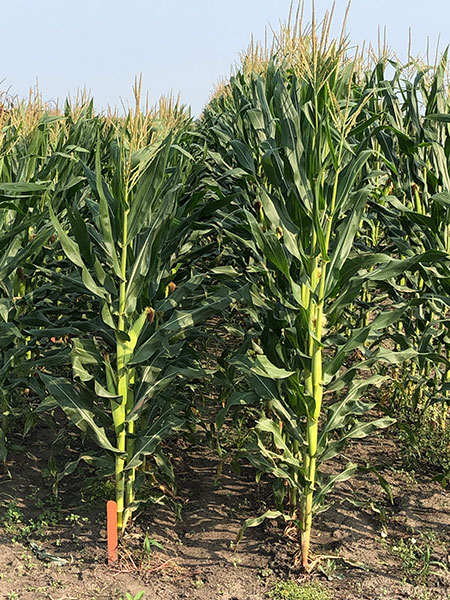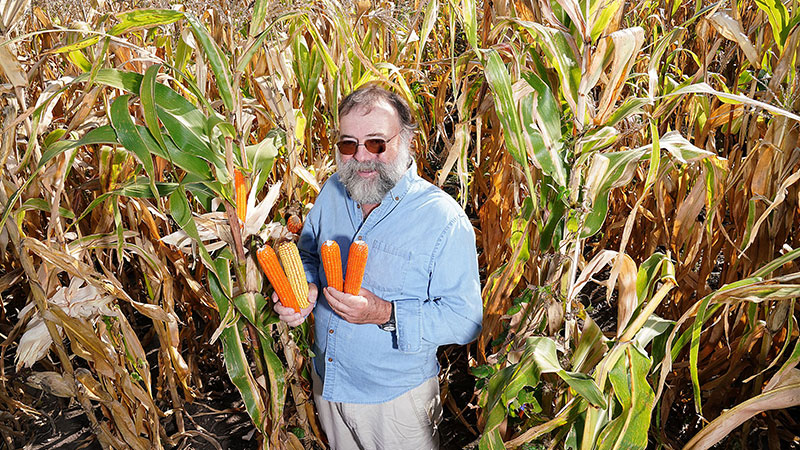February 2, 2022
3 Purdue projects receive $143,000 from Office of Technology Commercialization's Trask Innovation Fund
The Purdue Research Foundation Office of Technology Commercialization has awarded more than $143,000 to three projects, one each led by researchers in Purdue University’s College of Agriculture, College of Engineering and College of Veterinary Medicine.
The Trask Innovation Fund supports short-term projects that enhance the commercial value of Purdue’s intellectual property. The application deadline for the next round of funding is Feb. 18.

Guri Johal, professor, Department of Botany and Plant Pathology, College of Agriculture.
Johal received $49,013 for “Cloning and Validating the Gene Responsible for a Novel, Dominant Dwarf Mutant of Maize.”
Johal is developing a corn variant that could impact worldwide corn production. He said the current corn crop is excessively tall, which has multiple drawbacks for farmers, the environment and crop sustainability. They are easily damaged by windstorms, require high agriculture inputs like fertilizers and cannot be grown at high densities.
“Short-statured corn is more resilient than traditional corn and requires less inputs and farmland,” Johal said. “This enhances the margin for farmers and protects the environment in the process. The corn industry also stands to gain as more seed will be needed to plant the crop at higher densities.”
Johal’s short-corn variant, called D16, can be maintained as a pure stock. He said the hybrid plant it generates is optimal in both height and vigor. Trask funds will be used to further identify the role of the specific gene linked to short-stature corn.
“This Trask award will allow me to hire a postdoctoral fellow trained in genetics and genomics to clone the gene that underlies D16,” he said. “Once the mutant gene is cloned, we will have to validate it in either corn or another model plant, such as Arabidopsis. The correct cloning of the gene will also be validated by targeted mutagenesis of D16 in corn.”
Dr. Deborah Knapp, Distinguished Professor of Comparative Oncology, Dolores L. McCall Professor of Comparative Oncology, College of Veterinary Medicine.
Saeed Mohammadi, professor of electrical and computer engineering, College of Engineering.
Co-primary investigators Knapp and Mohammadi received $44,656 for “Detecting Transitional Cell Carcinoma and Leptospirosis in Urine.” The innovation has been licensed from the Office of Technology Commercialization to Molecular Diagnostics, a startup company.
The project focuses on creating a fast, noninvasive and low-cost cancer screening technique. The initial focus is detecting bladder cancer in dogs, but the eventual goal is detecting bladder cancer and other disease in people.
Mohammadi said the Trask award will make it possible to build a prototype to detect bladder cancer in urine samples of dogs. Project leaders will distribute prototype devices to researchers at Purdue and elsewhere who work on transitional cell carcinoma, or TCC, in dogs.
“Deborah is a world-renowned researcher on TCC. She will help with testing TCC and control samples,” Mohammadi said. “We hope to improve the sensitivity and specificity of our technique so it can be used to detect the disease at early stages and improve the prognosis of the disease. If this can be established, there will be a good potential for the application of such a simple and noninvasive technique for screening cancer in humans.”
Torbert Rocheford, Patterson Endowed Chair for Translational Genomics in Crop Improvement, Department of Agronomy, College of Agriculture.

Torbert Rocheford received $50,000 for “Developing High-Carotenoid Orange Sweet Corn.” Once developed, the innovation will be licensed to NutraMaize, his startup company led by his co-founder and son, CEO Evan Rocheford.
Torbert Rocheford said Americans are at a significantly increased risk of losing their vision as they age because they don’t eat enough carotenoids, which are antioxidant pigments that give many fruits and vegetables their yellow, orange or red color. Lutein and zeaxanthin are two carotenoids that protect our eyes from age-related macular degeneration, which Torbert Rocheford said is the leading cause of irreversible blindness in Americans older than 60.
“Lutein and zeaxanthin are predominantly found in green, leafy vegetables, which unlike sweet corn, are consumed in very low quantities in the U.S.,” Evan Rocheford said. “The goal of developing high-carotenoid varieties of sweet corn is to create an accessible and popular food that can make a meaningful impact on the amount of health-protecting lutein and zeaxanthin consumed by Americans.”
Evan Rocheford said the Trask award will help advance the development of Orange Sweet Corn varieties available for commercialization.
“As the commercial leader in Orange Field Corn, NutraMaize is excited to partner with Purdue to bring this exciting innovation to market that has the potential to positively impact the health status of millions of Americans,” he said.
About Purdue Research Foundation Office of Technology Commercialization
The Purdue Research Foundation Office of Technology Commercialization operates one of the most comprehensive technology transfer programs among leading research universities in the U.S. Services provided by this office support the economic development initiatives of Purdue University and benefit the university’s academic activities through commercializing, licensing and protecting Purdue intellectual property. The office recently moved into the Convergence Center for Innovation and Collaboration in Discovery Park District, adjacent to the Purdue campus. In fiscal year 2020, the office reported 148 deals finalized with 225 technologies signed, 408 disclosures received and 180 issued U.S. patents. The office is managed by the Purdue Research Foundation, which received the 2019 Innovation and Economic Prosperity Universities Award for Place from the Association of Public and Land-grant Universities. In 2020, IPWatchdog Institute ranked Purdue third nationally in startup creation and in the top 20 for patents. The Purdue Research Foundation is a private, nonprofit foundation created to advance the mission of Purdue University. Contact otcip@prf.org for more information.
Writer: Steve Martin, sgmartin@prf.org
Sources: Guri Johal, gjohal@purdue.edu
Saeed Mohammadi, saeedm@purdue.edu
Evan Rocheford, evan@nutramaize.com
Torbert Rocheford, torbert@purdue.edu
